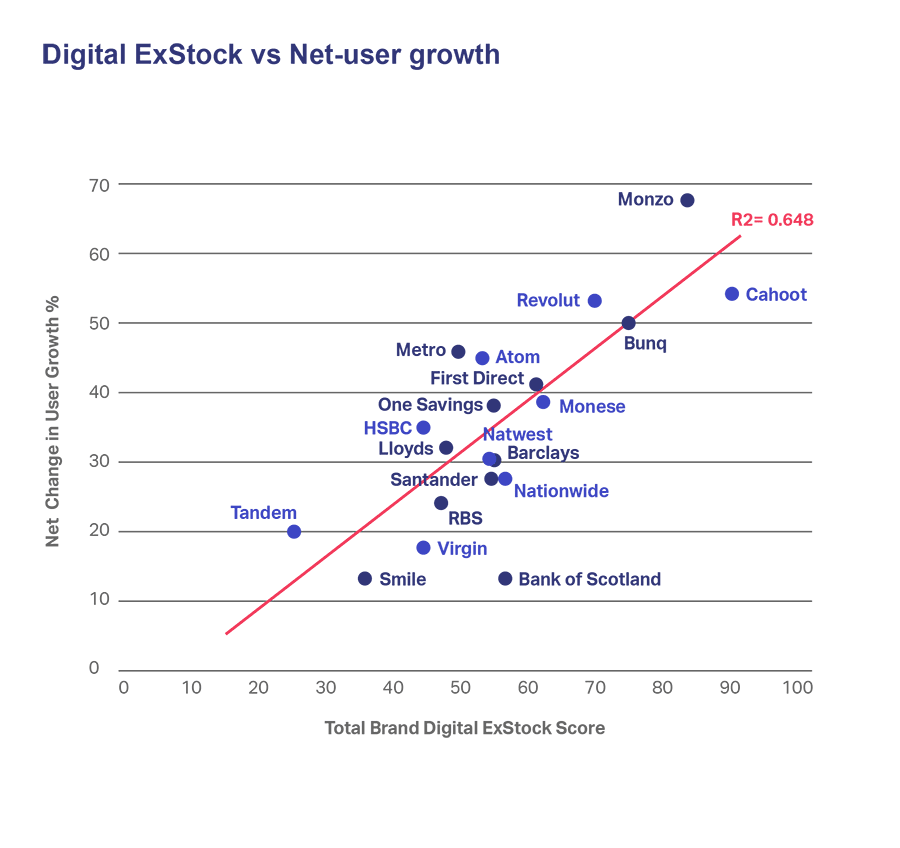Managing Editor, WARC Knowledge, Lena Roland, highlights some of the best pieces that stood out on the platform this week.
1. ‘Share of experience’ is the new brand battleground
The longstanding link between Share of Voice and Share of Market is being questioned as marketers look to prove the impact of experience. The latest edition of Admap looks at planning for experience, and includes new research from Publicis Sapient into drivers of growth in the banking sector. The study looked at three composite metrics: experience stock, reputation stock and net user growth. This pilot study shows that being associated with consistently good experience, and understanding customers' unmet digital needs drives experience stock.

Takeaway: Marketers looking to drive growth should have oversight across the entire customer journey, and may need new benchmarks when planning budgets.
Read more here: Experience works, and here’s how, Admap, October 2019
2. What will TV advertising look like in the age of Amazon?
Amazon has amassed vast amount of online (and offline) customer data and purchase history and is acquiring a 360-degree view of consumers' omnichannel shopping habits across key categories.
A combination of Amazon’s new targeted sampling initiative, Alexa-enabled Amazon Echo, Fire TV, Amazon Prime and its acquisition of ad-supported video inventory means Amazon has the potential to give advertisers the ability to match audience targeting with marketing outcomes. In this scenario, someone watching Amazon Prime could be served an ad for a product Amazon knows you purchase or might be running short of, all the viewer has to say is “add to cart” and the product is delivered next day. Convenient to some, creepy to others. Either way, it offers a glimpse of the power of Amazon and the future of TV.
Takeaway: TV advertising has proved remarkably resilient indeed it’s interesting to see a surge in DTC brands turning to TV for reach and scale. That said, to stave off threats from Amazon, and the glut of streaming services, television must develop better measures of effectiveness.
Read more here: Amazon will revolutionize the future of television advertising, Journal of Advertising research, Vol. 59, No. 3, 2019
3. Offline brands are building their own ecosystems
Built on data, Google, Apple, Microsoft, Uber, Amazon and Alibaba are ‘ecosystems’ that offer an interconnected set of services that enable consumers to complete a wide range of needs in one integrated experience. Kantar’s Victoria Sakal and Dr Emmanuel Probst identify the characteristics of ecosystem brands and show how offline brands such as Lego and Disney are leveraging technology and building their own ecosystems through powerful offline interactions.
Takeaway: Brands lacking the ability to develop a one-stop shop that meets various consumer needs can take an interim step by becoming a lifestyle brand, such as Equinox, the fitness brand is doing. This strategy can turn customers into subscribers, members, or even evangelists.
Read more here: From Lego to Apple: the new era of brand building is ecosystem driven, WARC Best Practice
4. Spotlight on E-sports
E-sports will benefit from the continuing growth of mobile gaming, as well as the increased penetration of mobile devices. The most successful stakeholders in the e-sports world strive to provide a tailored and curated experience to game participants, as the evolution of gaming and technology has transformed the gaming industry into a social activity that consumers are seeking and are willing to pay for.
Brands can advertise their products at live venues, or they can use live streams to advertise their products to a wider audience. These opportunities can lead to sponsorships and partnerships in hosting events that companies can capitalise on.
Takeaway: Ensuring compatibility among all partners from the start is essential to help align ideas and projects seamlessly and effectively.
Read more here: The growing world of e-sports: Defining growth, risks, and opportunities, Euromonitor, August 2019
5. Data ethics is set to become a strategic business weapon
The tech industry and negative societal impacts have prompted a tech-lash with calls for more regulation. The spread of AI, facial recognition, IoT devices, smart cities and the rise of surveillance marketing will only heighten the issue. Governments are starting to respond - the EU’s GDPR is already in force and the CCPA will be coming into force in the US in January 2020.
Takeaway: Marketers need to prepare for a world of stronger data protection rights. Beyond regulatory compliance, companies can rebuild trust by proactively embracing data ethics.
Read more here: What we know about data ethics, WARC Best Practice

